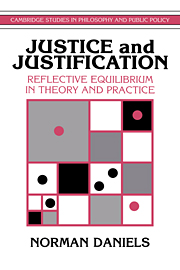Book contents
- Frontmatter
- Contents
- Preface
- 1 Introduction: Reflective equlibrium in theory and practice
- PART I
- PART II
- 9 Health-care needs and distributive justice
- 10 Equality of what: Welfare, resources, or capabilities?
- 11 Determining “medical necessity” in mental health practice, with James E. Sabin
- 12 The prudential life-span account of justice across generations
- 13 Problems with prudence
- 14 Merit and meritocracy
- 15 Rationing fairly: Programmatic considerations
- 16 Wide reflective equilibrium in practice
- Index
12 - The prudential life-span account of justice across generations
Published online by Cambridge University Press: 01 February 2010
- Frontmatter
- Contents
- Preface
- 1 Introduction: Reflective equlibrium in theory and practice
- PART I
- PART II
- 9 Health-care needs and distributive justice
- 10 Equality of what: Welfare, resources, or capabilities?
- 11 Determining “medical necessity” in mental health practice, with James E. Sabin
- 12 The prudential life-span account of justice across generations
- 13 Problems with prudence
- 14 Merit and meritocracy
- 15 Rationing fairly: Programmatic considerations
- 16 Wide reflective equilibrium in practice
- Index
Summary
During the 1980s, the issue of intergenerational equity entered policy debates about the target of health and welfare resources. Not only did the issue surface in the United States, but it became an important theme in Europe and even in many developing countries (Daniels 1990). In large part, the concern is driven by demographics: we live in an aging world, partly as a result of increased life expectancy, but largely as a result of falling birth rates. As the age profile - the proportion of the population in each age group - changes, social needs change. For example, as society ages, proportionally fewer children need education, fewer young adults need job training, but more elderly need employment, income support, and health care, including long-term care. Where the change is rapid, concerns arise about the stability of transfer schemes, and tension rises not only between age groups but between birth cohorts. Changing needs find political expression, and the old and the young appear to compete for scarce public funds that meet basic human needs.
A divisive issue like intergenerational equity may be pushed aside in the heat of a presidential campaign, but it will resurface. Indeed, President Bush proposed using savings from capping growth in Medicaid and Medicare budgets to fund expanded health insurance coverage to the working poor and their families. Such a proposal would intensify a problem we already have: nursing homes are already being made less accessible to those on Medicaid in Georgia because of restrictions on reimbursement rates (Watson 1992).
- Type
- Chapter
- Information
- Justice and JustificationReflective Equilibrium in Theory and Practice, pp. 257 - 283Publisher: Cambridge University PressPrint publication year: 1996
- 4
- Cited by

